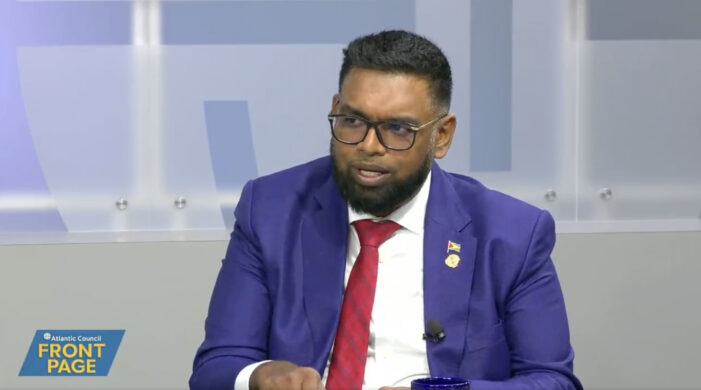ACCRA, Ghana, January 28, 2024 – CARICOM Chairman and Guyana’s President Dr. Irfaan Ali, emphasized the critical need to overcome existing trade barriers, transportation issues, and logistical challenges to harness the vast trade opportunities between Africa and the Caribbean.
Addressing a gathering of leaders and business executives, during the Africa Prosperity Dialogues 2024 Summit in Accra Ghana over the weekend, President Ali outlined a visionary approach for enhancing trade relations during his official visit to the West African nation of Ghana.
President Ali highlighted the immense potential for “massive increases in trade” between the two regions, advocating for strategic solutions to facilitate smoother trade. He underscored the importance of system improvements to address the current impediments to trade and logistics, which he sees as key to unlocking the full potential of this intercontinental partnership.
Ali pointed to the considerable opportunities in the realm of food security, proposing that both Africa and the Caribbean could reap mutual benefits. He emphasized the significance of this collaboration by noting that, although the Caribbean’s population may seem small, it provides access to a market of over 400 million people through established trade agreements within the region.
Focusing on specific sectors, President Ali identified aquaculture as a prime area for collaboration. He cited the size of the U.S. aquaculture market, valued at US$4 billion annually, and Guyana’s competitiveness in producing fish products for this market.
The CARICOM Chairman proposed a synergy of African technological know-how with Caribbean and Guyanese resources and land, advocating for innovative thinking and exploring opportunities beyond traditional areas.
The Guyana President also called attention to the need for joint efforts in addressing global challenges like climate change and energy security. He praised Africa for its ‘fearless leadership,’ using South Africa as an exemplar of a country that consistently stands up for what is right on the global stage.
Further delving into Africa’s capabilities, Ali spoke about the continent’s rich natural resources, including 30 percent of the world’s mineral reserves and 8 percent of the world’s natural gas. He emphasized that these resources, combined with adequate human resources and technological capacity, position Africa favorably in the global system.
The CARICOM chairman urged the forum to focus on building a winning culture adaptable to changing business environments and empowering institutional systems.
President Ali called for a robust “commitment to action” to meet targets and maintain progress towards these goals. The Summit, themed ‘Delivering Prosperity in Africa: Produce, Add Value, Trade’, serves as a vital platform for deliberating strategies to stimulate economic growth both within and between continents.
Through this initiative, President Ali’s vision marks a significant step towards fostering a stronger economic relationship between Africa and the Caribbean. By addressing the challenges head-on and leveraging each other’s strengths, both regions stand to significantly benefit, potentially transforming their economic landscapes and contributing to a more interconnected and prosperous global trade environment.
President Ali’s visit to Ghana was marked by a dual agenda. He not only engaged in discussions at the summit but also played a significant role in the inauguration of a new oil refinery, highlighting Guyana’s growing prominence in the energy sector.
Furthermore, on Friday, as slated received the Global Africa Leadership Award from APN, a non-government organization, in recognition of his leadership since assuming office in 2020.
However, the decision to honor President Ali with this award has sparked controversy. Approximately eleven Afro-Guyanese organizations have expressed strong opposition, citing the current behavior and historical actions of the PPP administration towards African Guyanese as reasons for their discontent.
These groups have criticized the Ghanaians for bestowing the award, particularly given President Ali’s record.
The Institute for Action Against Discrimination (IFAAD) issued a statement highlighting their concerns. IFAAD emphasized that leadership awards should recognize inclusive governance, ensuring equal opportunities and protection for all citizens, irrespective of ethnicity or background. According to IFAAD, these are qualities that President Ali and his administration lack.
The organization cautioned the APN against the distribution of such awards without careful consideration, warning that it risks losing credibility and sends a troubling message. They argue that granting this award to President Ali could imply an acceptance of leadership that marginalizes and suppresses certain communities, which contradicts the principles of true leadership and equality.
Critics of President Ali’s administration describe his presidency as divisive, with racial and political tensions simmering beneath the surface. Many in Guyana feel denied social and economic equality due to race, political affiliation, or independent views.
This undercurrent of discontent stands in stark contrast to the president’s international recognition and the ambitious economic plans he advocates for the Caribbean and Africa. However, the contention surrounding his award underscores the complexity of his leadership on the international stage, juxtaposed against the backdrop of domestic challenges and accusations of exclusionary politics.
As President Ali continues to advocate for strengthened economic ties between Africa and the Caribbean, the controversy at home serves as a reminder of the multifaceted challenges leaders face in balancing international acclaim with domestic governance and unity.





